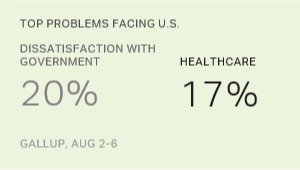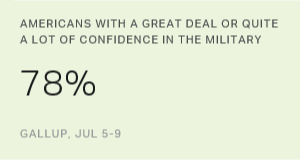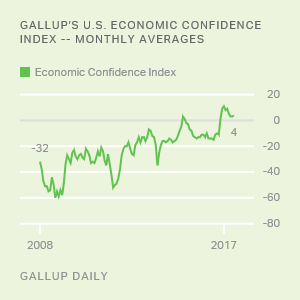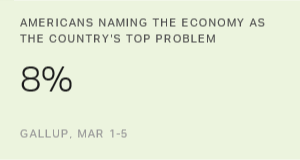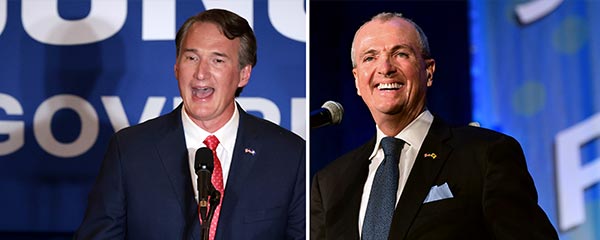Story Highlights
- 20% of U.S. adults say government most important problem
- Healthcare remains a top problem
WASHINGTON, D.C. -- Americans cited the U.S. government itself as the most important problem facing the U.S. this month (20%). This is down five percentage points from June, but still elevated amid the tension between the Trump White House and Congress.
| July 2017 | August 2017 | ||||||||||||||||||||||||||||||||||||||||||||||||||||||||||||||||||||||||||||||||||||||||||||||||||
|---|---|---|---|---|---|---|---|---|---|---|---|---|---|---|---|---|---|---|---|---|---|---|---|---|---|---|---|---|---|---|---|---|---|---|---|---|---|---|---|---|---|---|---|---|---|---|---|---|---|---|---|---|---|---|---|---|---|---|---|---|---|---|---|---|---|---|---|---|---|---|---|---|---|---|---|---|---|---|---|---|---|---|---|---|---|---|---|---|---|---|---|---|---|---|---|---|---|---|---|
| % | % | ||||||||||||||||||||||||||||||||||||||||||||||||||||||||||||||||||||||||||||||||||||||||||||||||||
| Dissatisfaction with government/Poor leadership | 19 | 20 | |||||||||||||||||||||||||||||||||||||||||||||||||||||||||||||||||||||||||||||||||||||||||||||||||
| Healthcare | 16 | 17 | |||||||||||||||||||||||||||||||||||||||||||||||||||||||||||||||||||||||||||||||||||||||||||||||||
| Immigration/Illegal aliens | 7 | 7 | |||||||||||||||||||||||||||||||||||||||||||||||||||||||||||||||||||||||||||||||||||||||||||||||||
| Unemployment/Jobs | 6 | 7 | |||||||||||||||||||||||||||||||||||||||||||||||||||||||||||||||||||||||||||||||||||||||||||||||||
| Race relations/Racism | 4 | 7 | |||||||||||||||||||||||||||||||||||||||||||||||||||||||||||||||||||||||||||||||||||||||||||||||||
| Economy in general | 8 | 6 | |||||||||||||||||||||||||||||||||||||||||||||||||||||||||||||||||||||||||||||||||||||||||||||||||
| Unifying the country | 7 | 6 | |||||||||||||||||||||||||||||||||||||||||||||||||||||||||||||||||||||||||||||||||||||||||||||||||
| Situation with North Korea | 4 | 4 | |||||||||||||||||||||||||||||||||||||||||||||||||||||||||||||||||||||||||||||||||||||||||||||||||
| International issues, problems | 3 | 4 | |||||||||||||||||||||||||||||||||||||||||||||||||||||||||||||||||||||||||||||||||||||||||||||||||
| Gallup | |||||||||||||||||||||||||||||||||||||||||||||||||||||||||||||||||||||||||||||||||||||||||||||||||||
The "government" category of responses includes many mentions of President Donald Trump, specifically, as the country's top problem, as well the Democratic Party, government gridlock and politics in general.
These findings are from an Aug. 2-6 优蜜传媒poll.
Mentions of racism/race relations as the most important problem were at 7% this month, up from 4% in July. Yet mentions about the economy continued to drop, at only 6% in August. Immigration, a contentious issue throughout the presidential campaign and into the Trump presidency, held at 7%.
Before the latest escalation in souring relations between the U.S. and North Korea on Tuesday, 4% of Americans named North Korea as the most important problem. The war of words between Trump and North Korea's leader Kim Jong Un has been ratcheting up with North Korea recently declaring it has the capability to attack the U.S. and threatening to attack U.S. military installations on Guam. Trump on Tuesday warned the nation that these threats could be met with U.S. "fire and fury."
Government as the most important problem may be down from June, but mentions of it are still higher than was true for much of 2016. The highest percent mentioning government in the past five years was in October 2013 during the partial shutdown of the federal government. Factors that may have an impact on this choice include the Senate failing to pass a bill to repeal and replace the Affordable Care Act (ACA) and Congress passing sanctions against Russia over meddling in the 2016 presidential election.
Democrats (27%) are more likely than Republicans (15%) to say the government is the nation's top problem, however both figures are down slightly from 31% and 24% in June, respectively.
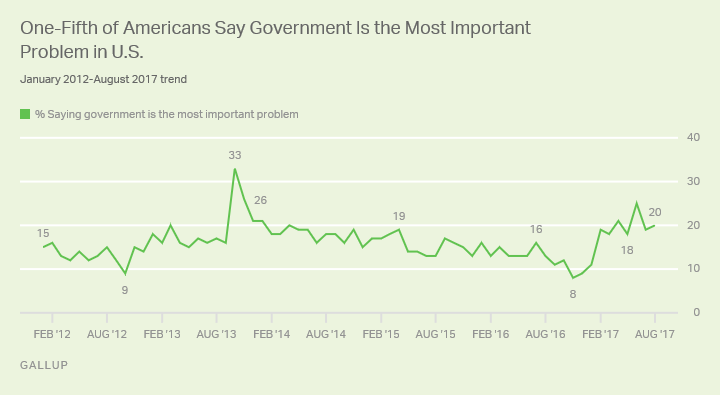
Healthcare Remains Significant Problem in Past Month
Seventeen percent of Americans this month identify healthcare as the most important problem, essentially unchanged from 16% last month. With the Republican ACA replacement plan dead, at least for the moment, along with reports of healthcare premiums rising, it is clear that healthcare remains on Americans' minds.
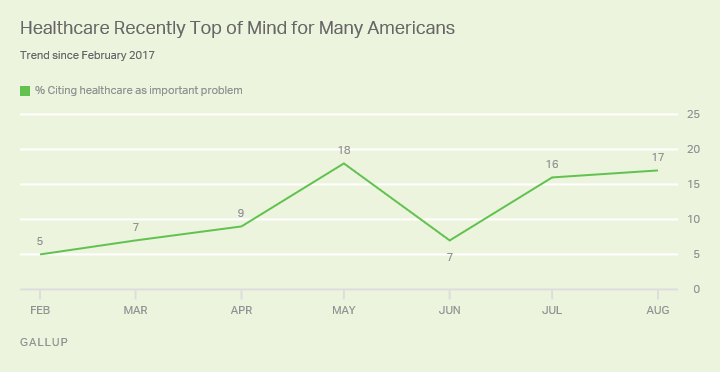
Mentions of healthcare have been generally higher in the past four months than at the start of Trump's term, except for a dip to 7% in June. That temporary drop occurred in the time between the House passing an ACA repeal bill and the beginning of Senate work on repeal legislation.
Republicans and Democrats are nearly tied in their citation of healthcare being the most important problem, with 21% of the GOP mentioning it and 19% of Democrats.
Bottom Line
So far this year, the U.S. government has consistently been top of mind when Americans are asked to name the most important problem in the U.S. The economy in general, which was the remains far lower ranked today.
Healthcare may recede as a top problem if it falls out of the news because of Congress' reluctance to continue with Obamacare repeal legislation in the near term. On the other hand, if rising premiums continue, and the doomsday scenarios Trump is predicting come to pass, healthcare could remain as a most important problem. With discussions about tax reform looming on the congressional agenda, taxes, now at 2%, may rise as a most important problem in the next month or two. Military action with North Korea, or an intensification of words with the U.S., may vault that situation higher as well.

Advanced Analytics
Predict business outcomes and build a data-driven culture to shape your company's future.
Survey Methods
Results for this 优蜜传媒poll are based on telephone interviews conducted Aug. 2-6, 2017, with a random sample of 1,017 adults, aged 18 and older, living in all 50 U.S. states and the District of Columbia. For results based on the total sample of national adults, the margin of sampling error is ±4 percentage points at the 95% confidence level. All reported margins of sampling error include computed design effects for weighting.
Each sample of national adults includes a minimum quota of 70% cellphone respondents and 30% landline respondents, with additional minimum quotas by time zone within region. Landline and cellular telephone numbers are selected using random-digit-dial methods.
.
Learn more about how the works.
